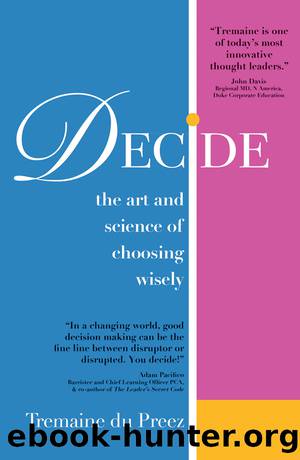DECIDE-The Art and Science of Choosing Wisely by Preez Tremaine du;

Author:Preez, Tremaine du;
Language: eng
Format: epub
Publisher: Marshall Cavendish International (Asia) Private Limited
Overconfidence
Overconfidence is often confused with someone simply having an overly inflated view of their abilities, knowledge, appearance, etc. Most people also assume thereâs a fine line between confidence and overconfidence. One can be confident in oneâs ability to perform a certain task because of the amount of practice, experience or preparation undertaken. If you know what you are doing because you have done it before, or the numbers really do back you up, or youâve used a thorough decision-making process, then confidence is justified. When does confidence become overconfidence?
One official definition tells us that overconfidence occurs when our confidence in our ability is greater than our actual ability. Of course, this could apply to overestimating our actual ability, or our ability relative to others, as well as being overly certain that we are right in our beliefs. Apparently, most of us are overconfident in the intelligence of our romantic partners as well.15 How is it possible that we are wilfully blind to such self-delusion? Surely life presents us with feedback that allows us to calibrate our beliefs to our abilities? I ask my students at the very first lecture of the term to write down what grade they think they will achieve in my class. I collect these papers and store them until the final grade is known.
Despite never having taken a âCritical Thinking in Decision Makingâ programme nor being taught by me, the vast majority of them simply put down their average grade modified by how easy they think critical thinking is. Itâs a non-technical subject for the most part, so grades are inflated by at least 10â20 per cent. In addition, I seem rather friendly which, apparently, further inflates their estimate. So here we have both anchoring (on their previous average grade) and overconfidence that that grade will repeat, despite very little information about the class.
The British historian Arnold Toynbee reminds us that, as far as civilisations go, nothing fails like success. Could it be that we automatically expect past patterns to repeat themselves or past successes to be recreated in different contexts under different conditions?
There is no shortage of examples of overconfidence from all corners of political, corporate, social and academic life. Studies confirm its existence but also caution that culture and personality affect our susceptibility to the bias, as do wealth, gender and expertise. A bias so destructive that Daniel Kahneman himself earmarked it as âthe first heâd eliminate if he had a magic wandâ.16
What have you been overconfident about? Wait, donât answer that yet. Overconfidence is a survival tactic and something that often gets rewarded, especially amongst academics, politicians, leaders and experts. This makes it even harder to identify and root out.
David Tuckett is Professor and Director of the Centre for the Study of Decision-Making Uncertainty at University College London and he reminds us that society rewards and sustains overconfidence: âWe would simply discard leaders who admitted they didnât know or gave us the truth, which is usually that the answer is filled with uncertainty.â17 Part of decision making is trying to imagine what will happen in the future.
Download
This site does not store any files on its server. We only index and link to content provided by other sites. Please contact the content providers to delete copyright contents if any and email us, we'll remove relevant links or contents immediately.
Hit Refresh by Satya Nadella(8345)
The Compound Effect by Darren Hardy(7576)
Change Your Questions, Change Your Life by Marilee Adams(6658)
Nudge - Improving Decisions about Health, Wealth, and Happiness by Thaler Sunstein(6643)
The Black Swan by Nassim Nicholas Taleb(6204)
Daring Greatly by Brene Brown(5652)
Deep Work by Cal Newport(5498)
Principles: Life and Work by Ray Dalio(5335)
Rich Dad Poor Dad by Robert T. Kiyosaki(5165)
The Myth of the Strong Leader by Archie Brown(4796)
Man-made Catastrophes and Risk Information Concealment by Dmitry Chernov & Didier Sornette(4749)
Big Magic: Creative Living Beyond Fear by Elizabeth Gilbert(4734)
The Slight Edge by Jeff Olson(4728)
Discipline Equals Freedom by Jocko Willink(4642)
Digital Minimalism by Cal Newport;(4568)
The Motivation Myth by Jeff Haden(4536)
Stone's Rules by Roger Stone(4423)
Management Strategies for the Cloud Revolution: How Cloud Computing Is Transforming Business and Why You Can't Afford to Be Left Behind by Charles Babcock(4135)
The Doodle Revolution by Sunni Brown(4051)
